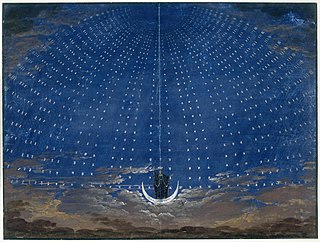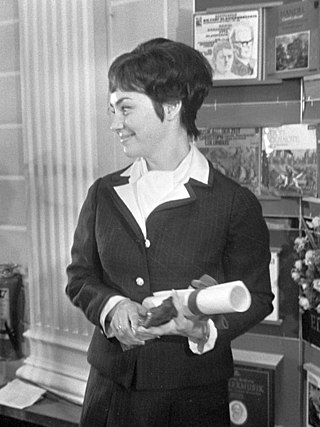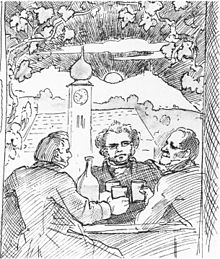
The Magic Flute, K. 620, is an opera in two acts by Wolfgang Amadeus Mozart to a German libretto by Emanuel Schikaneder. The work is in the form of a Singspiel, a popular form during the time it was written that included both singing and spoken dialogue. The work premiered on 30 September 1791 at Schikaneder's theatre, the Freihaus-Theater auf der Wieden in Vienna, just two months before the composer's premature death. Still a staple of the opera repertory, its popularity was reflected by two immediate sequels, Peter Winter's Das Labyrinth oder Der Kampf mit den Elementen. Der Zauberflöte zweyter Theil (1798) and a fragmentary libretto by Johann Wolfgang von Goethe titled The Magic Flute Part Two.

Dietrich Fischer-Dieskau was a German lyric baritone and conductor of classical music. One of the most famous Lieder performers of the post-war period, he is best known as a singer of Franz Schubert's Lieder, particularly "Winterreise" of which his recordings with accompanists Gerald Moore and Jörg Demus are still critically acclaimed half a century after their release.

The Merry Wives of Windsor is an opera in three acts by Otto Nicolai to a German libretto by Salomon Hermann Mosenthal based on the play of the same name by William Shakespeare.

Alfonso und Estrella, D 732, is an opera with music by Franz Schubert, set to a German libretto by Franz von Schober, written in 1822. Along with the later Fierrabras, composed in 1823, it marks Schubert's attempt to compose grand Romantic opera in German, departing from the Singspiel tradition. Unlike Fierrabras, it contains no spoken dialogue.

Edith Mathis is a Swiss soprano and a leading exponent of the works of Wolfgang Amadeus Mozart worldwide. She is known for parts in Mozart operas, but also took part in premieres of operas such as Henze's Der junge Lord.

Fierrabras, D 796, is a three-act German opera with spoken dialogue written by the composer Franz Schubert in 1823, to a libretto by Joseph Kupelwieser, the general manager of the Theater am Kärntnertor. Along with the earlier Alfonso und Estrella, composed in 1822, it marks Schubert's attempt to compose grand Romantic opera in German, departing from the Singspiel tradition. It had to wait until 1897 for a (relatively) complete performance.

Franz Adolf Friedrich Schober, since 1801 von Schober, was an Austrian poet, librettist, lithographer, actor in Breslau and Legationsrat in Weimar.

Johann Baptist Mayrhofer was an Austrian poet and librettist. He is best known for his close friendship with the composer Franz Schubert.

Franz Schubert (1797–1828): New Edition of the Complete Works, commonly known as the New Schubert Edition (NSE), or, in German: Neue Schubert-Ausgabe (NSA), is a complete edition of Franz Schubert's works, which started in 1956 and is scheduled to conclude in 2027. The projected number of volumes of the publication, which includes score editions, critical reports and supplements, is 177, of which, as of 2020, 150 have been realised.

Carl Wilhelm August Blum was a German singer, librettist, stage actor, director, guitarist and opera and song composer. Philip J. Bone wrote that Blum was "a universal genius, uniting in one person the poet, the dramatist, composer, singer and performer." He was composer to the Court of the King of Prussia.
Franz Schubert's best-known music for the theatre is his incidental music for Rosamunde. Less successful were his many opera and Singspiel projects. On the other hand, some of his most popular Lieder, like "Gretchen am Spinnrade," were based on texts written for the theatre.

Lazarus or Die Feier der Auferstehung, D 689, is an unfinished 1820 oratorio by Franz Schubert on a libretto by August Hermann Niemeyer. Intended to be in three acts, only act 1 with twenty-one numbers, and eight numbers from act 2 are extant.

Die Verschworenen, also known as Der häusliche Krieg is an 1823 one-act singspiel by Franz Schubert after a libretto by Ignaz Franz Castelli with spoken dialogue by the composer. Castelli's libretto was based on Lisistrata, ou Les Athéniennes, Comédie en un acte et en prose, mêlée de vaudevilles by François-Benoît Hoffman, which had premiered at the Théâtre Feydeau in Paris in 1802. The French play in turn was based on Lysistrata by Aristophanes.

Der Graf von Gleichen D 918 is an unfinished 1827 opera in two acts by Franz Schubert after a libretto by Eduard Bauernfeld.
Georg von Hofmann was an Austrian occasional poet.










